June 2021: Olive Tree

Volume VI/Issue 3/June 2021


From The Editorial Desk
Mother’s Day was just last month; And while the sane people in the country were saluting their moms with warm, loving, joyous “Happy Mother's Day” greetings, some of the spiritually disturbed people with out God were on a totally different wavelength.
They were on radio and in front of the TV cameras telling us that we should be saying, “Happy Birthing Person’s Day.” I’m not kidding! That’s what they were doing and they were serious. To them saying “mom” or “mother” is some kind of a demeaning sexist expression.
The same people wants a boy—who “thinks” he is a girl—to be given access to the girls’ locker rooms and allowed to compete in girls’ sporting events.
They hate any one who stands for what God thinks; but they freely quote Lenin, Mao, Marx and Castro.
They clamor for diversity but forcefully insist on having their way about everything.
They talk unity but spend every waking moment creating division. They give lip service to free speech but ban dissenting opinions,keeping them off social media and the networks.
They demand conformity to their “woke” culture mandates and invoke the “cancel” culture for those who refuse to comply.
They insist that homosexuality is normal and anyone who objects is abnormal.
From the kindergartners in your town to the halls of Congress they have taken charge and they are tearing our society apart.
They could have stopped their nonsense a long while back and it would have been enough of it, but they will never learn. The Bible tells us that “these sort” (II Timothy 3:6) will be “Ever learning, and never attaining to the knowledge of the truth.” (vs. 7).They are “men corrupted in mind, reprobate concerning the faith ” (vs. 8).
Even though the enemy of all things good and godly has gained its footing among us, you and I must not be apathetic. We must not accept a defeatist attitude. We must busy our own self with the things of the Lord. (Luke 19:13) and we must “Therefore take unto you the armour of God, that you may be able to resist in the evil day, and to stand in all things perfect.” (Ephesians 6:13). If even one Parish Priest and one Parish with the power of God in several thousand towns across this Nation would step up to the plate, I believe we could see a great revival in the land and that we could get the country on solid ground. Remember: “If my people, upon whom my name is called, being converted, shall make supplication to me, and seek out my face, and do penance for their most wicked ways: then will I hear from heaven, and will forgive their sins and will heal their land.”—II Chronicles 7:14. “And that knowing the season; that it is now the hour for us to rise from sleep. For now our salvation is nearer than when we believed. The night is passed, and the day is at hand. Let us therefore cast off the works of darkness, and put on the armour of light.”—Romans 13:11-12

We Own Nothing
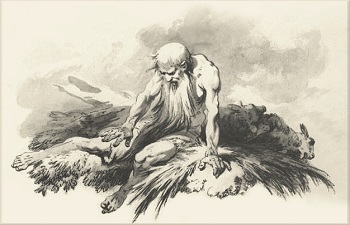
"And said: Naked came I out of my mother's womb, and naked shall I return thither: the Lord gave, and the Lord hath taken away: as it hath pleased the Lord so is it done: blessed be the name of the Lord." (Job 1:21)
We brought nothing into the world and we surely take nothing away with us. In fact, when we die, we cast aside our body like so much garbage for someone else to take care of. Everything we have and are comes from Almighty God.
This spiritual maxims flows from last month's, "Or know you not, that your members are the temple of the Holy Ghost, who is in you, whom you have from God; and you are not your own?" (I Corinthians 6:19) We are not our own, therefore what we possess is not our's either.
We need to consider our relationship with God and the relationship of everything in this world and God. What has happened is that we are considering our relationship with our fellow man and the State and their rights and responsibilities in our own regard as well as our own rights and responsibilities in their regard. If I have a right, then everyone else has a duty to respect that right and not infringe upon it, as we considered last month. God has granted us these rights so that we may discharge our duties to God and our family and others.
God places goods into our hands to use for His greater honor and glory, which includes taking care of our own self and our family and others as the case may be. And so we should consider anything in our possession as merely a tool owned by God and given into our use for the moment. He may take it away at a moment's notice, as He wills.
When we begin considering goods as our own rather than placed in our care, it is easy to proceed to some sinful ideas. For instance, this is my house, therefore I may do what I please in it. This is not true, because this implies that I may violate the Commandments in my own house. True I might be able to violate the Commandments and in some cases, the State has no right nor duty to interfere, but I may not. Ability does not imply permission. This is why we need to choose our words carefully, because words carry meaning and a specific meaning. To misuse words is the beginning of a lack of communication and even of sin.
Also we can become over protective of what we consider our own property and defend it against all aggression. True the aggression may be an evil, but is it our duty to resist all of these evils? "And to him that striketh thee on the one cheek, offer also the other. And him that taketh away from thee thy cloak, forbid not to take thy coat also." (Luke 6:29) It looks like our duty is the exact opposite. Saint Paul says: "Already indeed there is plainly a fault among you, that you have law suits one with another. Why do you not rather take wrong? Why do you not rather suffer yourselves to be defrauded?" I Corinthians 6:7) And let us return to Jesus: "And if a man will contend with thee in judgment, and take away thy coat, let go thy cloak also unto him." (Matthew 5:40) And so, we should not go to court but rather give in. Let us remember these are only material things.
Let us look back at the lives of the martyrs. They were dragged before courts and sentence to great injustice, that is to martyrdom, when they had committed no crime and violated no true law, for a law is an ordinance of right reason, promulgated by lawful authority for the common good. What good can be found in killing those who are living by the Gospel? Jesus warned: "Then shall they deliver you up to be afflicted, and shall put you to death: and you shall be hated by all nations for my name's sake." (Matthew 24:9)
We have become far too defensive of our rights that we are neglecting our duties before God and man. Much has been said, especially since the Ides of March of 2020, about how some of the actions of the government violate our rights. Much time has been wasted on this, when there is no real way to change this. Instead, we should realize that we get the government we deserve, and that is why the government is exceeding its mandate and has for centuries. (Actually we deserve far more for our sins than we are receiving.) The solution to our problems is not in ranting and raving about the violations, but in repentance and conversion. We must lead by our holy lives others to repentance and conversion, then we can "sanctify the Lord Christ in your hearts, being ready always to satisfy every one that asketh you a reason of that hope which is in you." (1 Peter 3:15)

Heart Divine
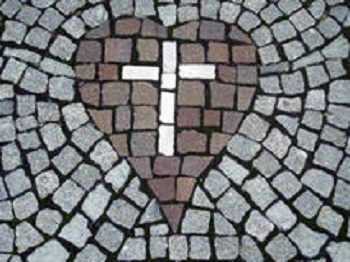
After several feasts in our Ecclesiastical Calendar these past weeks namely: Ascension, Pentecost, Trinity Sunday and Corpus Christi, we now honor the Sacred Heart of Jesus. We honor the Lord through practice of the following virtues :
H- Humility
E- Empathy
A- Availability
R- Responsibility
T- Thanksgiving
H- Humility. "Learn from me for I'm meek and humble of heart." (Matthew 11:25) Humility is best practice, not when everything is alright, when people praise you and when people recognize your goodness. Humility occurs when we experience humiliation; when people reject us. Our imperfections remind us that we must be humble.
E- Empathy. A saying goes, "Be in his shoes." More often we conclude, we judge persons and circumstances. But if people will know how to be in his shoes or practice empathy you will be more like Jesus. (read John chapter 8 on the woman caught in adultery).
A- Availability. Jesus entered into our history. Jesus entered into our time. If a person loves, he finds time. He is available. In as much as love is time. Several people especially young people are being unwanted because their parents do not have time for them.
R- Responsibility. It is derived from two words. Response and Ability. Ability to respond. Love begets love. Love compels us to respond. But that response depends on our ability, our gifts.
T- Thanksgiving. God has two residence: one is in heaven, two is in grateful heart. Remember the ten lepers healed by the Lord? Yet only one returned back to thank Him. "Where are the nine?" asked the Lord. Even though God does not need our praise because He is God anyway, in our thanksgiving to Him through our worship, we are most benefiting.
May the Heart of Jesus spur us on. Amen. Amen.

Time after Pentecost - Time for Grace
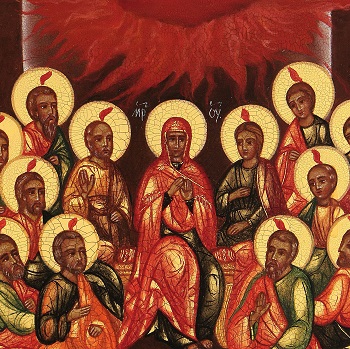
As we find so often in the Christian life, every day, every week, every season offers us the chance to resolve to begin living the life of grace in earnest all the more. And today is a great opportunity of exactly that challenge for us, for the coming year.
In the Gospel proclaimed on Pentecost, we hear our Lord calling out: If any man thirst, let him come unto Me, and drink!
Our Lord draws no man by force or compulsion, and He certainly does not attempt to debate or prove anything to anyone in order to win followers - but rather He simply calls anyone who thirsts, and offers to give him drink. He is the Wisdom and Power of God, He is the eternal and ever-existent Word of the Father, Who stands even today, now, just as He did then and calls the thirsty to drink. Let us taste and see and know that the Lord is good; He is the inexhaustible fount of goodness and immortality.
The living water which is offered is the grace of the Holy Spirit. For just as water comes down as rain from the heavens, nourishing and refreshing material creation; so also the Holy Spirit descends from heaven and nourishes and refreshes the soul.
The Holy Spirit is also called fire, because just as fire is one in appearance, but acts in various ways, warming, burning, illuminating, and cleansing, so it is with the Holy Spirit. As we hear in the Scriptures, "There are diversities of graces, but the same Spirit; and there are diversities of ministries, but the same Lord; and there are diversities of operations, but the same God, Who worketh all in all."
Even before our Lord's Passion and Resurrection, He gave His Disciples power against unclean spirits, to cast them out, and to heal all manner of sickness and all manner of disease. After His Resurrection, however, He bestowed the Holy Spirit upon them, not so much for raising the dead or doing other such wonders, but for the remission of sins, a far greater wonder.
God Himself abides in the soul of him who is forgiven of sins by the action of the grace of the Holy Spirit, as the Scriptures attest. There the glory of the Holy Spirit is called the kingdom of heaven, and it is within you, and the Holy Spirit makes His dwelling in us through faith.
And the Christian, who is guided, strengthened, and purified by the Lord's commandments, does not then simply have some vague spiritual illumination or human enlightenment. For our Lord attests, as we hear in today's Gospel, "I am the light of the world."
"I am the light of the world," He said. Not the light of Judaea or Galilee, the light of East or West. Not the light of one nation or another, one people or another, but the light of all the world. Christ calls Himself the Light of the world, for in Him is indeed the light of the divine glory; He shines With the radiance of understanding upon those who are spiritually purified. He enlightens us who are held in the darkness of ignorance. Christ is the Light, because He is the illuminator of souls which are being purified in word and life. If sin and ignorance are darkness, then certainly knowledge and life in God are light.
He that follows this Light will not abide in error and sin. He will not walk in darkness, but in the light of life, of truth, and of justice.
Who is a follower of this Light? Who is a follower of Christ? He or she who is a doer of the word, and not a hearer alone. He who is pious, she who lives righteously, he who is reverent, she who is generous, he who is long-suffering, she who is joyful; all those who work in the light Who is Christ, all those walking the path of grace, walking as in the day, for all these things are the fruit of a living faith, that most necessary virtue.
Let us, then, my friends, today as the rest of this year now spreads itself before us, this time after Pentecost, and as we face the good work which is to be done by us - and in us - during this time, let us resolve happily all the more to live piously, to live righteously and blamelessly, to walk honourably, and to follow the light of faith and of Christ's commandments. Let us not dwell in - or dwell on - the outer darkness of sin, the outer darkness of wickedness and error, of deceitfulness and spiritual delusion; but let us have the light of eternal life.
Heavenly King, Comforter, Spirit of Truth, Who art everywhere and fillest all, Treasury of good things and Giver of life: come and dwell within us, and cleanse us from every impurity, and save our souls, O Good One.

The Funny Pharmacy
A joyful mind maketh age flourishing: a sorrowful spirit drieth up the bones. - Proverbs 17:22
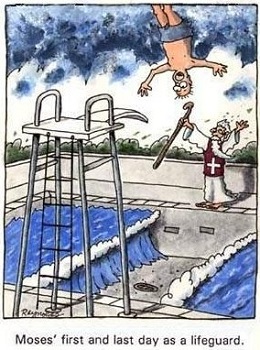
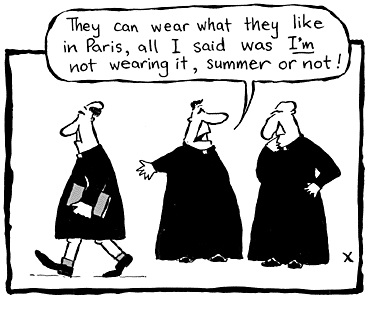


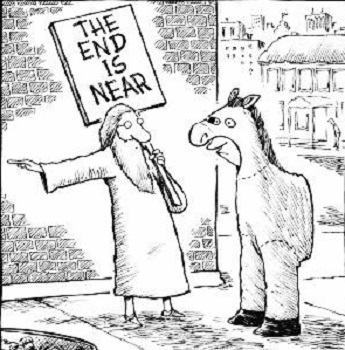

Frequently Asked Questions

What were the reasons given by those invited for not attending the conclave? Or were you simply ignored?
Most simply ignored. A few wrote against the election. We know Bishop Louis Vezelis of the Thuc Carmona, Musey line wrote against the election, but do not know what he said.
N. Martin Gwynne and John Daly wrote Briton's Catholic Library Letter number 7 against the pre-election book and sent copies to us. It had no substantial objections. As I recall, they wanted us to wait for Enoch and Elias to come and appoint a Pope. John Daly and Martin Gwynne have since separated. Their objections came in after the election, although they had been aware of it for months before.
A few objected that it was not the appropriate time, but gave no appropriate time. With a vacancy over ten times longer than the longest previously, we considered this could be dismissed. The second Canon of the Ecumenical Council of Lyons states in part: “Where a greater danger exists, there without doubt a fuller deliberation is necessary. How grave are the losses resulting from a prolonged vacancy, and how full of dangers it is to the Roman Church, is shown by prudent consideration of the past. Hence, a manifest reason urges us that, while we are engaged in the reformation of minor matters, we do not leave without remedy for suitable reform those things that are more dangerous.”
Kenneth Mock came with Father Patrick Henry CMRI. Mock said we should wait until a priest could be found with faculties to absolve us from any possible excommunication we had incurred for participation in the Traditionalist movement. We had publicly renounced any and all errors of this movement. When pressed, he could not find such a priest, and indeed no such priest existed. The penalties for participation in the Traditionalist Movement are reserved to the Pope, but the papacy was vacant. Canon Law also allows the Local Ordinary, that is the Bishop of our own Diocese, to absolve. However, all of these Sees were vacant. After that conversation, Mock and Henry left, saying they would pray on it. Mock left a message on the answering machine the next morning that they would not be participating.
Thomas Hemple and two of his sons, Matthew and Albert arrived late to the place of election. They had been notified well in advance and again closer to the time of the election. One would presume that people coming to such an important affair would indicate they are coming and arrive the day before as Mock and Henry did. Thomas Hemple had been working with Dr. Benjamin Franklin Dryden for years on a papal election. Attempt was made to contact Dr. Dryden, but he died before the election best we could find out.
Father (later Bishop) Jose Lopez-Gaston expressed interest in coming to the election. However, at the last minute he sent a letter indicating he would not come, but giving no reason. He had been ordained by Bishop Carmona.
For answers to more frequently asked questions, click here: https://www.vaticaninexile.com/frequently_asked_questions.php
The Pope Speaks: June 2021
Question Everything?

In the mid 1960s to the mid 1970s, Catholics began questioning what was happening in the Spirit of Vatican II, and so we should have. These same Catholics took action, especially when what was coming from the pulpit was simply not Catholic, it was heresy. Saint John Chrysostom comments on Hebrews 13:17: "Obey your prelates, and be subject to them. For they watch as being to render an account of your souls; that they may do this with joy, and not with grief. For this is not expedient for you." He continues: "How then does Paul say, 'Obey them that have the rule over you, and submit yourselves'? Having said above, 'whose faith follow, considering the end of their conversation' (c. ver. 7), he then said, 'Obey them that have the rule over you, and submit yourselves.' What then (you say), when he is wicked should we obey? Wicked? In what sense? If indeed in regard to Faith, flee and avoid him; not only if he be a man, but even if he be an angel come down from Heaven; but if in regard to life, be not over-curious."
In matters of Faith we must judge and flee those who deliver another Gospel as Saint Paul said: "But though we, or an angel from heaven, preach a gospel to you besides that which we have preached to you, let him be anathema." (Galatians 1:8) As We wrote in Our book, Will the Real Catholic Church Please Stand Up, we must make such judgments in matters of Faith, and if we have left the Conciliar Church under George Bergoglio, who claims to be Pope Francis in any manner, we have already judged. This includes those in the Apostles of Jesus and Mary under their public title, the Sacerdotal Fraternity of Saint Pius X (SSPX) at one end to the Congregation of Mary Immaculate Queen (CMRI) at the other end and any group in between. We have voted with our feet that George Bergoglio and the bishops and priests in union with him are not our pastors, but have deserted us by heresy. No other reason justifies departing from obedience to them.
Now after making the judgment that the Vatican II Conciliar Church is not the Catholic Church some Traditional minded Catholics have begun educating themselves and become experts in Sacramental Theology and Canon Law, judging whether or not someone is a valid priest or bishop or whether or not such a priest or bishop has any authority in the Catholic Church. And this includes priests and bishops of the Traditionalist movement making such judgments. However, judgment in many matters is reserved exclusively to the Church herself.
Today people are more concerned about valid Sacraments than they are in making sure they are truly in the Church founded by Jesus Christ, the Catholic Church. The sign out front might say Catholic, but we already know that many of these buildings are not actually run by Catholics, but by someone else. That is why we left the Conciliar Church, which has stolen not only our properties, but also our name, Catholic.
We hear Extra Ecclesiam Nulla Salus, (EENS) outside of the Catholic Church there is no salvation, and yet those speaking of this may be outside of the Catholic Church themselves. From our basic catechism we learn about the Church. We should also study the Roman Catechism also called the Catechism of the Council of Trent or the Catechism of the Catholic Church: Trent Edition. In there we learn: "It is the unanimous teaching of the Fathers that this visible head is necessary to establish and preserve unity in the Church." Jesus founded a hierarchical Church on Peter and the Apostles, when He said: "He said therefore to them again: Peace be to you. As the Father hath sent me, I also send you." (John 20:21) A Pope is necessary to send others into the vineyard to preach as Saint Paul observes: "And how shall they preach unless they be sent, as it is written: How beautiful are the feet of them that preach the gospel of peace, of them that bring glad tidings of good things!" (Romans 10:15)
Read the tenth chapter of Saint John's Gospel. In the first verse we read: "Amen, amen I say to you: He that entereth not by the door into the sheepfold, but climbeth up another way, the same is a thief and a robber." And so how can we know who has entered by the door? First of all, who has the keys to that door? To Peter and his successors Jesus said: "And I will give to thee the keys of the kingdom of heaven." (Matthew 16:19) Some may say, but you have just proven that there is no Pope. No, what we have proven is that the claimant in Rome is not Pope. A Pope is still necessary, it is simply not necessary that he be in Rome as history has proven in the past. The claimant in Rome, such as Anacletus II may be an Antipope, while the true Pope, such as Innocent II, is in exile elsewhere. Authority comes from Jesus through his Vicar the Pope through the Bishops ruling the various dioceses on down to the Pastors and other priests and deacons in those dioceses.
When there is confusion in who is truly Pope, one looks for the Pope. When one does not find him in Rome, one looks elsewhere. When one does not find him at all, then the the next step is to elect a Pope, because only a Pope can restore order. The result of ordaining priests, which Archbishop Lefebvre began doing in the 1970's did not restore Order. The consecration of Bishops, which began with Bishop Peter Martin Ngo-Dihn Thuc in 1981 did not restore Order. Both actions led to more fragmentation, when a Godly action will lead to unity. Pope Leo XIII states: "But the Epsicopal order is rightly judged to be in communion with Peter, as Christ commanded, if it be subject to and obeys Peter; otherwise it necessarily becomes a lawless and disorderly crowd." (Satis cognitum, paragraph 15) Aren't the Traditionalist bishops a disorderly crowd with no unity among them. Even those of the same mindset in regard to the status of the Papacy, the sedevacantists are not in union with each other, which shows that their position is at best incomplete.
We have wandered from our point. There are certain things all Christians must make decisions on. When we hear heresy, we leave, because the apparent Pastor bringing us heresy has left Jesus and His holy Church. However, many things are beyond our competence to judge as Christians, but belong exclusively to the hierarchy of the Church.
Let us consider some of the burning questions often discussed and who has the authority to give an authoritative answer:
Was Archbishop Lefebvre validly ordained and consecrated by the Mason Lienart? The answer to this question is reserved exclusively to the Pope for an authoritative answer.
Were the Consecration performed by Bishop Peter Martin Ngo-Dihn Thuc in 1981 valid or was Ngo-Dihn insane? The answer to this question is reserved exclusively to the Pope for authoritative answer.
Is the New Rite of Ordination valid? The answer to this question is reserved exclusively to the Pope.
Any today are usurping Papal Authority by rendering their own decisions in these matters and then proceeding on their conclusion. They appeal to the alleged emergency, but have failed to do anything to end the emergency in question. They appeal to several Canonical principles. However, the legitimacy of such application is reserved exclusively to the Pope. In fact, the Catholic Church has two forms of authority, ordinary and delegated. Ordinary authority is attached to an offices, such as Pastor, Bishop and Pope. Delegated is delegated by Canon Law or by someone with Ordinary authority, which is why the Bishop of a Diocese is also called an Ordinary. Traditionalists have stretched Canon 209 or performed what one priest before Vatican II called Canonical Gymnastics in order to establish a third form of authority, supplied. However, it is debatable whether one is permitted to use such authority in the cases mentioned in Canon 209. In regard to the validity of the Sacraments, we are obliged to take the safest course.
True, some of these things may apply to current cases, but only the Pope may judge on these matters. The duty of Christians is to find Christ's Vicar and submit to his authority. Even if one makes an incorrect decision here, God will supply here as He did in the Western Schism. No one in the Western Schism desired to not be subject to the Pope. Their only question was, who was Pope, for we desire union with Jesus through His Vicar. Today we should have the same desire and stop questioning everything.


Saint Mark the Ascetic
On The Spiritual Law

112. If some obvious sinner who does not repent has suffered nothing before his death, you may be sure that judgment in his case will be merciless.
113. He who prays with understanding patiently accepts circumstances, whereas he who resents them has not yet attained pure prayer.
114. When harmed, insulted, or persecuted by someone, do not think of the present but wait for the future, and you will find he has brought you much good, not only in this life but also in the life to come.
115. Just as the bitterness of absinth helps a poor appetite, so misfortunes help a bad character. For the first benefits the physical condition, and the second leads to repentance.
116. If you do not want to suffer evil, do not inflict it, since the suffering of it inevitably follows its infliction. 'For whatever a man sows he will also reap.' (Gal. 6:7)
117. Reaping unwillingly the wickedness we deliberately sow, we should marvel at God's justice.
118. Because an interval of time elapses between sowing and reaping, we begin to think there will be no requital.
119. When you sin, blame your thought, not your action. For had your intellect not run ahead, your body would not have followed.
120. The secret sinner is worse than those who do evil openly; and so he receives a worse punishment.
Saints from East and West
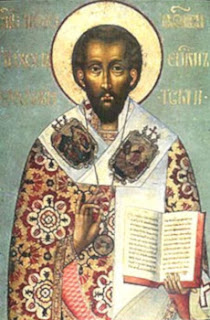
16 June - Saint Tikhon, Bishop of Amathis.
Sainted Tikhon, Bishop of Amathis (Amaphuntum), was born in the city Amathis on the island of Cyprus. His parents raised their son in Christian piety, and taught him the reading of Sacred books. There is an account extant that the gift of wonderworking appeared in Saint Tikhon at a still quite youthful age.
His father was the owner of a bread bakery and he sent his son to distribute bread. The holy lad gave bread free to the needy. Learning about this, his father became angry, but the son answered that he had read in the holy books that "in giving to God one receiveth back an hundredfold." "I too," said the youth, "gave to God the bread which was taken," and he persuaded his father to go to where the grain was stored. With astonishment the father saw that the granary which formerly was empty, was now filled to overflowing with wheat. From that time the father did not hinder his son from distributing bread to the needy.
A certain gardener brought from the vineyard the dried prunings of vines. Saint Tikhon gathered them, planted them in his garden and besought the Lord that these branches might take root and yield salubrious fruit for the health of people. The Lord did so through the faith of the holy youth. The branches took root, and their fruit had a particular and very pleasant taste and was used during the lifetime of the saint and after his death for the wine in making the mystery of the Holy Eucharist.
They accepted the pious youth into the church clergy, made him a reader, and afterwards the bishop of Amathis, Memnon, ordained him to the dignity of deacon. After the death of Bishop Memnon, Saint Tikhon by universal agreement was chosen as bishop of Amathis. The ordination was headed by Sainted Epiphanios, Bishop of Cyprus (+403).
Saint Tikhon laboured zealously for the eradication of the remnants of paganism on Cyprus - he destroyed an idolatrous temple and spread the Christian faith. The sainted-bishop was generous, his doors were open to all, and with love he listened to and fulfilled the request of each person who came to him. Fearing neither threats nor tortures, he firmly and fearlessly confessed his faith before pagans.
In the service to Sainted Tikhon it is pointed out that he foresaw the time of his death, which occurred in the year 425.

27 June - Saint Ladislaus of Hungary.
If Hungary owed the establishment of its monarchy and the organization of its church to Saint Stephen I, it was almost equally indebted to another sainted king of the same house of Arpad. For Ladislaus extended its borders, kept its enemies at bay, and made it politically a great state. But it is not for such activities that men are canonized (if, indeed, Ladislaus ever was formally canonized, which appears to be doubtful); and it is for his private life and work for Christianity that reverence is due to his memory.
After a childhood and youth whose background was political intrigue and dynastic violence, Ladislaus (Laszlo) came to the Hungarian throne in 1077; but his rights were contested by his kinsman Solomon, whom eventually he defeated in battle.
The young prince was said to be the embodiment of the outward graces and inner virtues of the ideal knight of chivalry. Towering head and shoulders above the crowd, he had the strength and courage of a lion, combined with a courteous affability that endeared him to all. His piety, which was as fervent as it was well balanced, expressed itself in his zeal for the faith, in the punctilious fulfilment of his religious obligations, in the strictness of his morals, and in the austerity of his life. Entirely devoid of personal ambition, he accepted the dignity thrust upon him from a sense of duty. In pursuance of a policy dictated alike by his religious and his patriotic instincts, Ladislaus allied himself closely with Pope Gregory VII and the other opponents of the German emperor, Henry IV. He espoused the cause of Henry's rival, Rupert of Swabia, and married Adelaide, the daughter of Rupert's chief supporter, Duke Welf of Bavaria. Within the boundaries of Hungary itself he had to face repeated invasions from the Kumans and others, but he successfully repulsed them all and did his best to win barbarian tribes to Christianity and civilization; at the same time he allowed civil and religious liberty to the Jews and the Ishmaelites, i.e. Mohammedans. It was at his solicitation that King Stephen I, his son Emeric, and the martyred bishop Gerard were recognized by the Holy See as worthy of veneration as saints.
Ladislaus governed with a firm hand in both civil and ecclesiastical affairs, as was seen at the diet of Szabolcs and when, in 1091, his sister Helen, the widowed queen of Croatia, appealed to him for help against the murderers of her husband. He marched in, restored some sort of order, and established the see of Zagreb. But when Helen died childless he annexed Croatia and Dalmatia, in the face of remonstrances from the emperor at Constantinople, the republic of Venice and the Holy See. Nevertheless Blessed Urban II looked for his help in organizing the First Crusade, and it was Ladislaus who was chosen by the kings of France, Spain and England to be the commander-in-chief of that expedition. However he was not destined to march with the rest, for he died rather suddenly at Nitra in Bohemia in 1095. He was fifty-five years old.
The body of Saint Ladislaus was taken for burial to Nagy Varad (Oradea Mare in Transylvania)-to the city and the cathedral which he had founded. From the moment of his death he was honoured as a saint and a national hero, and his deeds have formed the theme of many popular Magyar ballads and tales. His relics were solemnly enshrined in 1192.

Advice You Can Bank On
A Catholic Perspective On Finances
How can self-rejection lead to financial trouble?
When a man struggles with self-rejection or a sense that his wife is rejecting him, his attitudes affect every aspect of his life, including his marriage and finances. The following progression traces the damage that inferiority brings and offers insights for overcoming it.
Inferiority leads to insecurity.
When a man does not understand and accept unchangeable features, whether those unchangeables are his own or those of his family members, he develops deep feelings of inferiority and resentment. The resulting struggle hinders his ability to lead his family in the ways of God.
His failure to lead prompts feelings of insecurity and resentment in his wife, who longs to be able to depend on him for wise and consistent leadership in their marriage and family.
Extravagance fosters fear.
A husband who does not accept himself often attempts to improve his self-image by investing in expensive clothing, cars, furnishings, and other status symbols. In order to purchase such items, he may go into debt. His wife might not sympathize with his “need” to go into debt for expensive items, and although she accepts his gifts and provision, she develops fears and insecurity because of the debt that comes with them.
Wrong priorities develop divided loyalties.
Motivated by his need for approval, the husband commits himself to reach certain financial goals. In order to reach those goals, he allows or even encourages his wife to begin working outside the home.
His wife goes to work and finds herself in two competing worlds: home and the workplace. She finds that her personal needs (that her husband did not meet) can be partially fulfilled through the satisfaction her job brings and the income it generates.
Feelings of rejection lead to resentment.
The husband’s feelings of inferiority increase as he relies more and more on his wife’s income to help provide for the family. As his self-rejection increases, he now rejects his wife and children in an effort to make them help bear the blame for the frustrations they all are experiencing.
His wife reacts to his rejection. She harbors a growing resentment about the tight budget they must follow because of his unwise financial decisions, and she begins to look for fellowship and encouragement from sources other than her husband, who has greatly disappointed her. The wife’s self-pity increases, and her disappointment in her husband turns into disgust toward him, and she further condemns and rejects him.
Reaction paves the way for separation.
Financial pressures increase the husband’s stress and feelings of self-pity as well, tempting him to be quick-tempered and irritable. He also reacts to his wife’s independent spirit; he expected his wife to have patience while he worked through his problems. However, their problems only become more intense and more unbearable.
His wife completely loses confidence in his leadership as she sees the pressures mounting. She tries to give him counsel, but she does not understand his deep need for a sense of self-worth—in God’s eyes, in his own eyes, and especially in his wife’s eyes.
Convinced that her husband is proud and stubborn, the wife decides that she must look out for her own interests. Both spouses have become convinced that the other partner is responsible for the conflicts and problems in their marriage and family, and both become more and more selfish and demanding.
Self-acceptance leads to freedom and new beginnings.
All too often, this sequence ends in separation and divorce. A couple who is struggling financially should look beyond the numbers and discern if there are other issues that need to be resolved. For example, the husband must realize that success and material possession do not determine his worth.
As the husband learns to accept God’s design in his life, he can walk in freedom from inferiority and self-rejection. Consequently, he will not be driven to improve his worth by living beyond his income, and sharing these insights with his wife will give them a starting point for restoring their relationship and finances.
His humility and meekness will woo his wife’s heart more powerfully, passionately, and permanently than any of the gifts he bestowed on her previously, because she will recognize his willingness to assume his role as the leader of their family. God will pour out His mercy on both of them as they seek Him first—together.

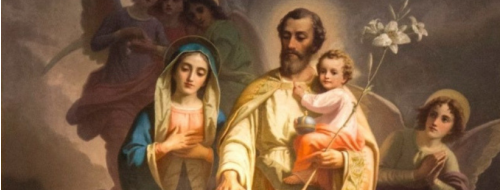 Family Matters
Family Matters
The "Empty Nest"
For some of you, older children have remained in the nest, but they have matured and care for themselves. These can be a blessing, too. Or when the last one has flown, God called you into service to be parents to other children.
Let's consider what the empty nest is not: At times it is not glamorous! A young married man often remarked he can't wait until the glamour days come, meaning the empty nest. Webster defines glamour as mysterious fascination, alluring charm, or magic attraction. In later years this man's empty nest brought illness and poor health for both of them and their children did not embrace the values and faith of their parents. How sad. They felt so unwanted and alone.
Sometimes we think life is based on satisfying our appetites, new clothes, dining out, entertainment, living the "good life", having means to purchase whatever we desire. In the end those things leave us empty and unfulfilled. An empty nest couple helping to work in missions in another country, with a smile on her face and sparkle in her eyes exclaimed, "This is the best vacation I ever had. Doing things for others brings JOY.
Another aspect of being alone together causes us to notice things that make us wonder: When did my husband or my wife start that habit? It's so easy to find fault with what they do or what they leave undone and to fret about the way we think things should be. Why do we do that? As Christians we believe there is an enemy of our souls who wants our marriages to fall apart--even in old age. Part of the problem is we don't recognize this enemy or his tactics. We don't look beyond ourselves or our mate to the root of the cause. This example comes from the Readers Digest and is a little humorous. A husband was ready to hang pictures for his wife, and asked, "Shall I hang them too low or too high?" Do you see the problem? She was hard to please!
Strive to focus on the things we appreciate about our mates and verbally express gratitude. Accept the fact that we are far from perfect and let's not expect perfection from our mates. If you find yourself with a critical spirit, take it to the Lord, and receive the help you need. Look for ways to please or surprise the spouse in your life. It might take effort. It could be such a small thing as a wife making one of her husbands favorite foods. Or give up reading your book when she suggests going for a pleasant evening walk. It's all a part of submission to the husband as Christ and the husband loving the wife as the Church. This is a stepping stone in God's will for us.
I am thinking of two women who were especially hard hit with the fact of becoming empty nesters. They both, when looking ahead, didn't know how they could survive seeing their last child leave home. The one by her demeanor, found God's grace sufficient as she accepted God's will. The other sister living in another country not only watched her children leave the nest, but also fly out of her country to far away places. It was difficult but she experienced God's grace carrying her. One Author writes--"One who forfeits the grace of God is like a bitter, noxious weed which poisons the lives of others. Refusal to accept God's grace in difficult situations isolates us as a sulking child, wrapped up in his own misery, and refusing comfort. When we accept what is offered by God, we find peace." Even so for us, as we accept the changes of life, we too will feel peace.
The empty nest brings changes--it is a transition from one type of life to the next. There is loneliness and quietness. Instead of taking turns to talk, no one is talking. "One partner might say, "Well say something." Remember the times not too long ago when you thought quietness is BLISS. The baby was sleeping, the preschoolers were playing nicely, and the others were in school. Ah, you could just relax. But now it's different and I'm glad. Together we look forward to the future in glory, yet we become anxious because of the world scene. We can become over anxious for our grandchildren. We vacillate between these feelings.
We can become over anxious. When it's just us two, the wife can fret, now who is going to help me when we have guests? It's amazing how much hubby can help. Years ago he didn't have time for such domestic matters. Who will rave over something you accomplished, be it a new dish, or a difficult sewing project, a new décor? ... The children are all gone! Does anyone care or appreciate? Your husband probably will notice if you point it out to him!
Being a mother identified us in the category as those caring for the little people and bigger ones, too. It got us out of bed in the morning (and in the night). We were needed. Now are we needed anymore, by anyone? One individual confessed to shedding tears every day. "I feel like I've been fired." Another one remarked, "Finally I have time for myself but it can get boring at times." One woman remembers how she felt when her last one matured and left home. She told her husband it is so empty around here. He asked her if she didn't enjoy being with just him! She did BUT. Several years later he asked her if she has learned to enjoy living with just him. She replied, “Yes. It just took time to get there.” Don't feel bad when you have feelings like that. It's normal.
It can be disappointing when you realize that outward beauty is fleeting with age. Gray hair, wrinkles, the old look, energy level is low and you go for a doctor check up and the doctor tells you that it's your age. At 75 you are well and it's normal to get tired. Shocking but true.
Realization hits when we realize that good things come to an end and people move on. Peers develop health issues. Accepting that your sister is gone because of the ravages of Alzheimer’s but she's present in body yet. Or others pass on to their eternal reward.
Reminiscing about the past may bring to mind the many times we have failed and we wish we could live that chapter of life over again. But Paul in Philippians 3:13 admonishes to forget those things which are behind, and reach forth unto those things which are before us.
There are four factors which can contribute to loneliness:
• Loss of motivation. We were accustomed to multi-tasking, Now it's different.
• Another one is Loss of confidence. Our Parent work is done. We might feel "Is there anything I can do?"
• Or A Loss of clearly defined community. Once I was in this circle of activity. Now where do I fit in? We lose touch with what is going on and yet we want to be included.
• The loss of identity--our identity was defined by having children at home and being involved in their interests. It's no longer that way. We are in this new season and like it or not we must make adjustments.
Here are some practical helps. Recognize the season principle called "Timeline" Accept the challenges that change brings and choose to focus on the blessings. By doing so we will discover joys God has for us--no Season lasts forever. If health and strength and soundness of mind permits, we want to really live in each unique season…we don't want to miss anything! The path of loneliness may seem to be a wilderness, but it can lead us to God. Proverbs 18: 10--"he name of the Lord is a strong tower: the just runneth to it, and shall be exalted." One way to focus on the good things of life is before getting out of bed in the morning, name three things you are thankful for. In a year that totals to approximately 1,000 blessings.
This is a time to develop new relationships, too. As your children leave, do not hold onto them in an unhealthy way. We must now LET GO. Their confidant must now be their new spouse, not Mom or Dad. Yet parents must assure their children that they care and are there for them if they need advice or help. We must strive to build a good relationship with the new in-law. Nurture new relationships with families your children have married into. But don't compete with the "other" family.
Now is the time to draw closer to your spouse, communicate how you are feeling, you may be surprised to discover your spouse is battling also, but likely responding differently. We will be more likely to give and receive grace, rather than to become critical or hurt.
Now let's focus on the advantages of an Empty Nest. For the wife, your work load will become lighter---less cooking, less cleaning, less laundry, less demands, etc. You can set your own schedule, come and go as you please, or even sleep in! You will have more time for each other. Now is the long-awaited time when you can plan getaways, attend retreats or spend time with friends, or husband beamingly announces to others that his wife has more time to spend on him since she isn't so busy with the children. What a compliment! One can spend more time for personal devotions or spend time together in Bible study. It's easier to do "spur of the moment" activities. Sometimes the wife may feel an infringement on her plans for the day. But remember tomorrow may be too late to do what your husbands suggests for today. If you feel you have too much free time, you may consider doing volunteer work…there are so many needs. One lady in a parish confided to being reluctant to accept a request for help which her husband felt led to accept. Let us seek God's will before we respond negatively or affirmatively. Some things look overwhelming, but we are not in it alone. It's surprising how much we will enjoy going with our spouse doing ministry within the Parish. One of the biggest blessings can be going to a bible study together. For some the blessing comes by going on missionary trips to other countries, or maybe you can fill a slot by visiting the aged or ailing ones in your local community through a Legion of Mary type of ministry. Remember if Jesus is Lord of our lives, that place is a holy place of service for Him. Ephesians 2:10 "For we are his workmanship, created in Christ Jesus in good works, which God hath prepared that we should walk in them." God is not so concerned about our happiness as he is in our holiness.
Too often we focus more on the big events of life and consider routine days as unimportant. We must not think of any day as ordinary but live each day fully in the moment. Life is serious, but we need to work at having a sense of humor. Sometimes that can ease the stress. "A joyful heart doeth good like medicine." Proverbs 17:22
We were all created to know the Creator and have a relationship with Him. Living the rest of our years with hope and purpose---and none of us knows how many that will be--begins with a personal relationship with God Himself. Can we grow in valuing solitude and silence as a meeting place with Him? As we see the sunset approaching, let's focus more on the eternal reward awaiting us. The empty nest is a blessing.
Don't miss out on a blessing in your senior years because it isn't packaged the way you expect.
God's blessings to all of you no matter which stage of life you are in.


Books to feed your faith!
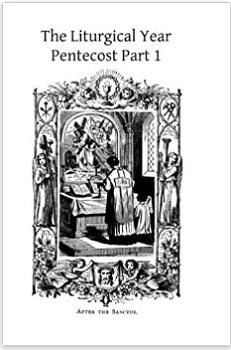
The Liturgical Year: Pentecost (Part One)
$20.95
This is a fifteen volume set, which is being brought back into print for the edification of the Faithful. Anyone who wishes to appreciate the timeless Tridentine Mass and liturgy will find this set a valuable aid in that endeavor. Dom Gueranger has produced a most excellent work, which began the liturgical movement. We pray that this set of books will bring many more to a true appreciation of the Latin Mass and the Divine Office of the Catholic Church. At one time, under the impulse of that Spirit, which animated the admirable Psalmist and the Prophets, she takes the subject of her canticles from the Books of the Old Testament; at another, showing herself to be the daughter and sister of the holy Apostles, she intones the canticles written in the Books of the New Covenant; and finally, remembering that she, too, has had given to her the trumpet and harp, she at times gives way to the Spirit which animates her, and sings her own new canticle. From these three sources comes the divine element which we call the Liturgy. The Prayer of the Church is, therefore, the most pleasing to the ear and heart of God, and therefore the most efficacious of all prayers. Happy, then, is he who prays with the Church, and unites his own petitions with those of this Spouse, who is so dear to her Lord, that he gives her all she asks. It was for this reason that our Blessed Saviour taught us to say our Father, and not my Father; give us, forgive us, deliver us, and not give me, forgive me, deliver me. Hence, we find that, for upwards of a thousand years, the Church, who prays in her temples seven times in the day, and once again during the night, did not pray alone. The people kept her company, and fed themselves with delight on the manna which is hidden under the words and mysteries of the divine Liturgy. Thus initiated into the sacred Cycle of the mysteries of the Christian year, the faithful, attentive to the teachings of the Spirit, came to know the secrets of eternal life ; and, without any further preparation, a Christian was not unfrequently chosen by the Bishops to be a Priest, or even a Bishop, that he might go and pour out on the people the treasures of wisdom and love, which he had drunk in at the very fountain-head. For whilst Prayer said in union with the Church is the light of the understanding, it is the fire of divine love for the heart. The Christian soul neither needs nor wishes to avoid the company of the Church, when she would converse with God, and praise his greatness and his mercy. She knows that the company of the Spouse of Christ could not be a distraction to her. Is not the soul herself a part of this Church, which is the Spouse? Has not Jesus Christ said: Father, may they be one, as we also are one? and, when many are gathered in his name, does not this same Saviour assure us that he is in the midst of them? The soul, therefore, may converse freely with her God, who tells her that he is so near her; she may sing praise, as David did, in the sight of the Angels, whose eternal prayer blends with the prayer which the Church utters in time.
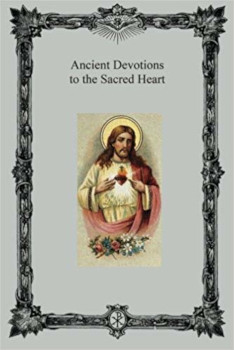
Ancient Devotions to the Sacred Heart
$15.95
When we think of devotion to the Sacred Heart, we think of Saint Margaret Mary. However, this devotion goes back further in history to Saint John Eudes, who wrote on the subject. And now we see that the Carthusians also were following this devotion before Saint Margaret Mary. A glance at these pages will show how justified was Dom Le Masson in claiming that the devotion revealed to St. Margaret Mary and made popular by her effotts was already an old one in the Carthusian Order. Dom Cyprien, before re-editing Dom Le Masson's work, had already written on Lansperge the Carthusian and Devotion to the Sacred Heart. Lansperge had, in fact, a special part in the propagation of the Devotion in the sixteenth century: but he only developed what was a tradition of long standing in his Order. Ludolph the Carthusian had already written before the middle of the fourteenth century in his Life of Christ those words which have been chosen for the opening pages of our present anthology; and from that time on the tradition remained unbroken. Nor was it confined to one Charterhouse, or to one Province of the Order. It is not surprising that many of the writers whose works are quoted belonged to the Rhineland Province, for the Charterhouse of Cologne, which had the reputation of displaying the greatest love for learning of all the Houses of the Order, had a marked influence on the Province. But the pen was not the only instrument used for spreading the Devotion. Not content with writing about the Devotion to the Heart of Jesus, these apostles of love contrived to engrave Its image on the very walls of stone with which their Monasteries were built. The escutcheon reproduced as a frontispiece is worthy of partic'llar notice. It forms the key-stone of an arch at the Grande Chartreuse in that part of the old cloister which was built after the fire of 1473. A cross is seen rising out of a tomb, with the three nails, the rod and the sponge on a reed on the right, and on the left three dice, pincers and hammer, and a scourge. Above are the thirty pieces of silver, and the crown of thorns is hanging on the right arm of the cross. These arms of the Passion are common enough: what is exceptional in the shield of the Grande Chartreuse is the heart in the centre of the cross, with a large wound entirely penetrated by a lance. This has been reckoned as the oldest known carving of the Sacred Heart of Jesus. This work consists of thirty elevations to the Sacred Heart followed by a week devoted to the Sacred Heart. A section is devoted to prayers for all occasions, including preparation for death.
Will the Real Catholic Church Stand Up?
Kindle $2.99 / Paperback $9.95
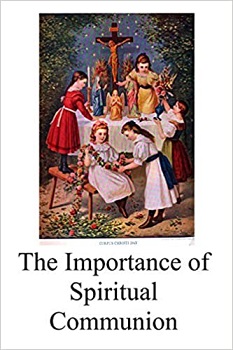
The Importance of Spiritual Communion
Kindle $2.99 / Paperback $5.99
If we cannot receive Holy Communion actually, then let us do so spiritually. These prayers and instructions have been gathered from the Saints and other venerated spiritual writers. Spiritual Communion has been a part of the spiritual life for decades. Growing up I was instructed to make a Spiritual Communion, when I could not go to Communion such as when I assisted at a second Mass. The same is true if one finds oneself at Mass, but not fasting. There are times coming, when it will be difficult, if not impossible to assist at the Holy Sacrifice of the Mass. We should be prepared for such times.
For More Good Traditional Catholic Books:

Super Summer Corn Salad

Ingredients
6 ears corn, husked and cleaned
3 large tomatoes, diced
1 large onion, diced
¼ cup chopped fresh basil
¼ cup olive oil
2 tablespoons white vinegar
salt and pepper to taste
Directions
1. Bring a large pot of lightly salted water to a boil. Cook corn in boiling water for 7 to 10 minutes, or until desired tenderness. Drain, cool, and cut kernels off the cob with a sharp knife.
2. In a large bowl, toss together the corn, tomatoes, onion, basil, oil, vinegar, salt and pepper. Chill until serving.
Melba's Favorite Raspberry Icebox Cake

Ingredients
24 graham crackers, crushed
⅓ cup butter
¼ cup packed brown sugar
1 (6 ounce) package raspberry flavored Jell-O® mix
1 cup boiling water
15 ounces frozen raspberries
20 large marshmallows
⅓ cup milk
1 cup heavy whipping cream, whipped
Directions
1. Preheat oven to 350 degrees F (175 degrees C).
2. Mix graham cracker wafer crumbs, butter and brown sugar until well combined. Set aside 1/4 cup of this mixture for a topping and press the remainder into one 9x13 inch pan.
3. Bake at 350 degrees F (175 degrees C) for 10 minutes. Set aside to cool.
4. Dissolve raspberry gelatin in the boiling water and add the frozen raspberries, stirring until melted. Chill until partially set and spread on wafer base.
5. Melt marshmallows with the milk. When cool, fold in whipped cream and spread on top of raspberry mixture. Sprinkle with remaining crumbs. Chill for 3-4 hours before serving.
Video sermons and instructions: Timeless timely truths for living the Faith
Pentecost, 2013.
Trinity Sunday, 2013.
Second Sunday after Pentecost, 2013.
Lamp and Light: The Beginning of Jesus' Ministry.
Catechism in Story - Saint Francis.

Encouragement for Today
Therefore encourage one another and build one another up.... I Thessalonians 5:11
We believe that through our assorted podcasts, Vlogs, audio downloads and devotional blogs, you will find an assorted Treasure Chest of...
- Sermons
- Classic Catholic Audio Books.
- Devotionals
- Scripture Studies
- Catechism Lessons
- Old-Time Christian radio programs
- Catholic Videos
...that will be a help in your faithful walk with the Lord.
LEARN MORE AT THE ENCOURAGEMENT FOR TODAY WEBSITE: https://www.encouragementfortoday.com
For The Flutes
“Who crying to their companions say: We have piped to you, and you have not danced: we have lamented, and you have not mourned.”
- Matthew 11:17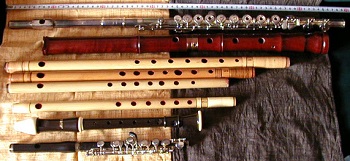
Psalms 5 suggests that the music is “for the flutes”. As with the stringed instruments, this instruction probably covers an entire class of instruments which make their sound by vibrating columns of air.
The air is set vibrating by a number of methods. In modern brass instruments, it is the players’ lips that start the vibration by a method known today as embouchure. This was known in biblical times with the use of instruments such as trumpets, made from rams’ horns. Other instruments produce air vibration by reeds, or by blowing air over a hole. Pitch is affected by changing the length of the air column, and this can be achieved by several means, such as re-rerouting the air through different length pipes (e.g., trumpet valves), by a slider (trombone), by having different length pipes (pan-pipes and organs), or covering and uncovering holes (flutes, saxophones, etc).
Though only Psalms 5 has this instruction, there are many other places in the Bible where wind instruments are mentioned. Such passages include where Samuel meets the prophets (1 Samuel 10:5), worshiping at the mountain of the Lord (Isaiah 30:29), or at the funeral of the little girl that Jesus raised (Matthew 9:23).
It seems that God has ordained many uses for music in our lives – to bring joy and dancing, or sorrow.
Catechism Catch-Up
Thy Kingdom Come
In Mathew 6:5-15, the Lord taught us to pray "Our Father who art in heaven, Hallowed be Thy name. Thy kingdom come.”
The man who prays, "Thy kingdom come" is one who has set his mind and his affection and his desires on things above. He's not one who has put on a dress of Christianity and holiness. His spirituality is not superficial. It goes right through to the very fiber of his being. He is more interested in laying up treasures in heaven than treasures on this earth.
A Christian's attitude to money is one of the clearest tests of his spiritual level, and of whether he is really longing for the kingdom of God to come or not.
I remember hearing a story of a farmer who told his wife one day, "Our cow has just given birth to two calves, a white one and a brown one. And I thought that when they've grown up, we should give one of them to the Lord." His wife asked him, "Which one are you going to give to the Lord, the brown one or the white one?" He replied, "Well, we can decide that later when they grow up." The calves grew up and they became fatter and fatter. One day the farmer came home with a sad face and told his wife, "I've got sad news for you. The Lord's calf just died." And his wife said, "But how did you know which was going to be the Lord's calf? You hadn't decided on that yet." He said, "Oh well, all along I had it in my mind to give the brown calf to the Lord; and it just died this morning."
It is like that with most Christians. It's always the Lord's calf that dies! They give God what's left over after all their own needs have been met. And because they're not "rich towards God" they remain spiritually poor all their lives (Luke 12:21).
In the Old Testament God had made a law that the Israelites had to give their "choice first fruits" to the Lord (Exodus 23:19). This was the only way they could "honor the Lord" (Proverbs 3:9). It's the same today. We cannot honor the Lord if we don't give Him our best.
What do we find in our life? Is there always some excuse why we cannot give the best to God. Then it shows where our heart really is. Where a man's treasure is, there will his heart be also. But the man who prays, "Thy kingdom come," is a man who has been delivered from the love of money and material things. He lives for God and for eternity now.
The kingdom of God means the government of God, the absolute rulership of God. It means making Jesus Christ absolute Lord over every area of our life. If we want the kingdom of God to come, it must first come in our hearts, in our homes, and in our parishes. In these places we must give no place to Satan or to the flesh. Our longing should be that the kingdom of God should so fill our hearts, our homes and our churches that there will be no room there for anything else.
The Holy Spirit came to bring "the kingdom of God with power" to earth (I Corinthians 4:20). Our parishes should be a demonstration to the world today of what the kingdom of God is like - that which will one day cover the whole earth. Here is where we have failed the Lord.
When Jesus told us to seek God's kingdom first and not to be anxious about earthly things, what He meant was that if we really wanted to be anxious about something, we should be anxious that the kingdom of God should come on earth as it is in heaven (Matthew 6:33). How many of us are burdened with that type of anxiety - for the purity of the church and the coming of God's kingdom? May God find many among us who will seek His kingdom first.
READ MORE FROM THE TRADITIONAL CATECHISM AT THE WEBSITE: https://www.traditionalcatechism.com
Living Catholic:
Learning to Fear the Lord: Deepening Your Awareness Of God’s Presence

The fear of the Lord is an awareness that you are in the presence of a holy, just, and almighty God and that He will hold you accountable for your motives, thoughts, words, and actions. To fear God is to desire to live in harmony with His righteous standards and to honor Him in all that you do.
We do not naturally seek to honor God, because our sinful natures lead us to pursue selfish pleasures instead of delighting in God and discovering the joy of knowing and loving Him. We must choose to walk in the fear of the Lord. The psalmist David prayed, “Conduct me, O Lord, in thy way, and I will walk in thy truth: let my heart rejoice that it may fear thy name. ” (Psalm 86:11).
Throughout the Bible, many promises are given to those who fear the Lord, such as Proverbs 22:4: “The fruit of humility is the fear of the Lord, riches and glory and life.” It is wise to be governed by a healthy fear of God!
The following disciplines will help you comprehend more of His greatness and more of your dependence on Him, thereby learning the fear of the Lord.
Consider God’s Creation
When we look around at God’s creation—the majesty of towering mountains, the expanse of oceans with their high tides and low tides, the intricacy of delicate flowers, the brilliance of the sun, and the glory of our galaxy—we can catch a glimpse of how awesome our God is!
-
The psalmist David often expressed his awe of God by meditating on God’s handiwork. He wrote, “For I will behold thy heavens, the works of thy fingers: the moon and the stars which thou hast founded. What is man that thou art mindful of him? or the son of man that thou visitest him?” (Psalm 8:3–4).
-
When God gave His Law to the nation of Israel, He first revealed His mighty power through nature so that the people would learn to fear Him. “And all the people saw the voices and the flames, and the sound of the trumpet, and the mount smoking: and being terrified and struck with fear, they stood afar off, Saying to Moses: Speak thou to us, and we will hear: let not the Lord speak to us, lest we die. And Moses said to the people: Fear not: for God is come to prove you, and that the dread of him might be in you, and you should not sin.” (Exodus 20:18–20).
-
The Apostle Paul also recognized that God reveals His power to mankind through His creation. “. . . That which may be known of God is manifest in them; for God hath showed it unto them. For the invisible things of him from the creation of the world are clearly seen, being understood by the things that are made, even his eternal power and Godhead; so that they are without excuse” (Romans 1:19–20).
Respect God’s Word
Having a high regard for the Bible, the Word of God, is an essential part of growing in the fear of the Lord. When we take time to read Scripture and commit to applying its universal, non-optional truths, we learn more about the nature of God, His ways, and our role as His creatures.
-
All the people of Israel were to gather to hear the Word of God so that they would learn to fear Him. “And the people being all assembled together, both men and women, children and strangers, that are within thy gates: that hearing they may learn, and fear the Lord your God, and keep, and fulfill all the words of this law: That their children also, who now are ignorant, may hear, and fear the Lord their God, all the days that they live in the land whither you are going over the Jordan to possess it.” (Deuteronomy 31:12–13). (See also Deuteronomy 4:10, 6:24, and 8:6.)
-
"Thou shalt set him whom the Lord thy God shall choose ....And when he is made king,... he shall copy out to himself the Deuteronomy of this law in a volume, taking the copy of the priests of the Levitical tribe, And he shall have it with him, and shall read it all the days of his life, that he may learn to fear the Lord his God, and keep his words and ceremonies, that are commanded in the law;" (Deuteronomy 17:15–19).
-
Today, Christians have been made a “Kingdom of kings and priests unto God” (Revelation 1:6). We are to understand the worth of Scripture and to study it and apply it to our lives. “All scripture, inspired of God, is profitable to teach, to reprove, to correct, to instruct in justice, That the man of God may be perfect, furnished to every good work.” (II Timothy 3:16–17).
Learn From Scriptural Examples
God’s glory and holiness call for our worship and submission. When people in Scripture encountered God, they instinctively demonstrated a deep reverence for Him. We can learn from these examples in our quest to fear God as we should.
The thought of God’s judgments on sin should strike fear into every heart:
-
David used strong language to describe God’s judgments. “Thy wrath hath come upon me: and thy terrors have troubled me.” (Psalm 88:16).
-
The Apostle Paul spoke of God’s judgment as a motivation to preach the Gospel. "For we must all be manifested before the judgement seat of Christ, that every one may receive the proper things of the body, according as he hath done, whether it be good or evil. Knowing therefore the fear of the Lord, we use persuasion to men;. . .” (II Corinthians 5:10–11).
Supernatural demonstrations of God’s power often left people trembling with fear:
-
"In the same hour there appeared fingers, as it were of the hand of a man, writing over against the candlestick upon the surface of the wall of the king's palace [God Himself wrote on the wall]: and the king beheld the joints of the hand that wrote. Then was the king's countenance changed, and his thoughts troubled him: and the joints of his loins were loosed, and his knees struck one against the other." (Daniel 5:5–6).
-
On the morning of Jesus’ resurrection, an angel appeared and rolled back the stone from the door of the tomb: “And his countenance was as lightning, and his raiment as snow. And for fear of him, the guards were struck with terror, and became as dead men.” (Matthew 28:3–4).
When Godly men of the Old and New Testaments heard God’s voice and saw His glory, they were filled with the fear of the Lord:
-
The prophet Isaiah responded with fear when He saw a vision of God in the temple. “And I said: Woe is me, because I have held my peace; because I am a man of unclean lips, and I dwell in the midst of a people that hath unclean lips, and I have seen with my eyes the King the Lord of hosts.” (Isaiah 6:5).
-
When the prophet Daniel saw a vision, he testified that he had no strength and fell down prostrate: “And I being left alone saw this great vision: and there remained no strength in me, and the appearance of my countenance was changed in me, and I fainted away, and retained no strength. And I heard the voice of his words: and when I heard, I lay in a consternation, upon my face, and my face was close to the ground. And behold a hand touched me, and lifted me up upon my knees, and upon the joints of my hands. And he said to me: Daniel, thou man of desires, understand the words that I speak to thee, and stand upright: for I am sent now to thee. And when he had said this word to me, I stood trembling.” (Daniel 10:8–11).
-
At the time of the Apostle Paul’s conversion, he was astonished at Christ’s message to him on the road to Damascus. The revelation of God’s reality and glory overcame all previous misconceptions about Jesus’ identity: "Who said: Who art thou, Lord? And he: I am Jesus whom thou persecutest. It is hard for thee to kick against the goad. And he trembling and astonished, said: Lord, what wilt thou have me to do?" (Acts 9:5–6).
-
When the Apostle John received the revelation about the end of the world and saw Jesus on the Isle of Patmos, he was filled with the holy fear of God: “And I turned to see the voice that spoke with me. And being turned. . . . And when I had seen him, I fell at his feet as dead. And he laid his right hand upon me, saying: Fear not...” (Revelation 1:12, 17).
When we encounter a power that is far greater that we are, we often respond with fear. This response was demonstrated by people who witnessed the supernatural power of Jesus Christ:
-
The disciples were afraid when Jesus stilled the storm: “And they feared exceedingly: and they said one to another: Who is this (thinkest thou) that both wind and sea obey him?” (Mark 4:41).
-
When Jesus cured a man possessed by many demons, the people feared Him: “And all the multitude of the country of the Gerasens besought him to depart from them; for they were taken with great fear. . . .” (Luke 8:37).
-
Jesus’ disciples were frightened when He appeared to them after His resurrection: “Now whilst they were speaking these things, Jesus stood in the midst of them, and saith to them: Peace be to you; it is I, fear not. But they being troubled and frightened, supposed that they saw a spirit.” (Luke 24:36–37).
Welcome God’s Chastening
When we rebel against God’s holiness, we will surely face consequences. God’s chastening of sin is painful, yet it is the expression of a loving Father’s care for His children.
-
Scripture instructs us to embrace God’s discipline and learn from the reproofs of life: “My son, reject not the correction of the Lord: and do not faint when thou art chastised by him: For whom the Lord loveth, he chastiseth: and as a father in the son he pleaseth himself.” (Proverbs 3:11–12).
-
The Body of Christ is challenged to receive God’s chastening and become more holy: “Persevere under discipline. God dealeth with you as with his sons; for what son is there, whom the father doth not correct? . . .Moreover we have had fathers of our flesh, for instructors, and we reverenced them: shall we not much more obey the Father of spirits, and live? And they indeed for a few days, according to their own pleasure, instructed us: but he, for our profit, that we might receive his sanctification. Now all chastisement for the present indeed seemeth not to bring with it joy, but sorrow: but afterwards it will yield, to them that are exercised by it, the most peaceable fruit of justice.” (Hebrews 12:7, 9–11).
-
David expressed the pain of past failure in Psalm 51 and humbly sought God’s mercy and cleansing: “To thee only have I sinned, and have done evil before thee: that thou mayst be justified in thy words, and mayst overcome when thou art judged.. . . . Thou shalt sprinkle me with hyssop, and I shall be cleansed: thou shalt wash me, and I shall be made whiter than snow.. . . . Create a clean heart in me, O God: and renew a right spirit within my bowels.” (Psalm 51:4–10).
Give a Offering From Your Increase
Along with supporting the work of the local parish, one of the purposes of giving is to learn to fear the Lord: Part of walking in the fear of the Lord is acknowledging that God is in control of every aspect of our lives, including our resources.
-
The Apostle Paul reaffirms the same truth: “Now this I say: He who soweth sparingly, shall also reap sparingly: and he who soweth in blessings, shall also reap blessings. Every one as he hath determined in his heart, not with sadness, or of necessity: for God loveth a cheerful giver. And God is able to make all grace abound in you; that ye always, having all sufficiency in all things, may abound to every good work,” (II Corinthians 9:6–8).
Recall the Chief Duty of Man
Israel’s King Solomon is renowned as the wisest man who ever lived, yet he made serious mistakes. Solomon forsook the fear God. Even though he received tremendous blessings from God, he disobeyed God’s Law in numerous ways and eventually worshiped false gods. God held Solomon responsible for these sins and brought judgment to the nation of Israel and to Solomon’s family because of them. (See Deuteronomy 17:14–17, I Kings 4:26, and I Kings 11:1–13.)
In the Book of Ecclesiastes, Solomon records his observations about the meaning of life. In the end, he states that the “conclusion of the whole matter” is the fear of the Lord. Let’s heed these words of warning from a man who knew the justice and judgment of God!
“Let us all hear together the conclusion of the discourse. Fear God, and keep his commandments: for this is all man: And all things that are done, God will bring into judgment for every error, whether it be good or evil.” (Ecclesiastes 12:13–14).
To Learn More Principles For Life Go To: Resources: Principles of Life


Pray for the Holy Father! Pray with the Holy Father!
- Your prayers are asked this month and every month for the intentions of the Holy Father, Pope Michael.
- Pray for the Holy Father in the preparation for the tenth anniversary of His Holiness' Coronation on Friday, December 10, 2021.
- Your prayers and support are asked in a special way for the soon to be established House of Prayer.
- Pray especially that the Holy Ghost inspires and helps us prepare spiritual manuals and days of recollection to make available to all.
- Keep in your prayers our Podcast Ministry, a new way to reach out in the missionary work of the Church! We ask for prayers for our other activities world wide. We have made good contacts in the Philippines and Japan and ask prayers that these contacts will bear much fruit for the salvation of souls.
- Be sure to keep St. Helen Catholic Mission in your prayers. Why not go on over to the site now and see what they have to offer and how you might be able to help!
- Also we ask you to keep in prayer our increasing missionary work in the United States and elsewhere.
- Pray for those outside the Church and those who do not know God, that they may see the light of grace and be led safely home to the refuge of the Holy Catholic Church.
- As always, we also ask that you pray for yourself! Never forget your own state of soul. God is calling you to His service in His love. We know that our Lord can count on you to answer.
- We are all praying especially for you, too. May you correspond with every grace of God!
- In what other needs or intentions may we pray for you? Let us know!
- Let us remember that the Church runs on prayer. Without your prayers, God will not work in hearts and souls to bring them to a knowledge of the truth. (I Timothy 2:4)


To Donate online go to:

To Donate by Mail:
Our address is
Vatican in Exile
829 NE Chester
Topeka, Kansas 66616
Make Checks payable to:
Vatican in Exile

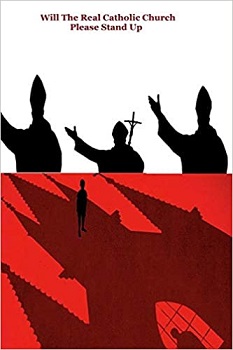









 Follow
Follow


